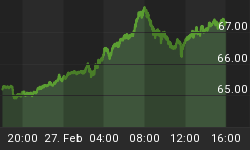Last week the Bundesbank (the German central bank) surprised markets around the world by announcing that it will repatriate a sizable portion of its gold bullion reserves held in France and the United States. To many, the news from the world's second largest holder of gold signaled a growing, if clandestine, mistrust among central banks, possibly fueled by diverging policy goals. The Germans have attempted to tamp down the alarm by highlighting the myriad of logistical, practical and historical reasons that qualified the announcement as unremarkable. But the size, scope, and timing of the move makes it hard not to draw more strategic conclusions.
Coming during a time of supposed central bank cooperation, the decision to withdraw billions of dollars of bullion was bound to raise eyebrows. At present, Germany has official gold holdings of some 3,396 tonnes. 1,500 tonnes resides in New York and 374 tonnes in Paris. Between now and 2020, Germany will repatriate 674 tonnes of gold - 300 from the Fed in New York (valued at $17.9 billion) and the entire 374 tonne allotment from Paris (valued at $22.3 billion). Although financial leaders like Fed Chairman Ben Bernanke have said that gold "is not money" and senior investors like Warren Buffet have described it as "a barbarous relic," the movement of gold nevertheless makes a strong emotional impact. Is such a response justified?
Coming during a time of supposed central bank cooperation, the decision to withdraw billions of dollars of bullion was bound to raise eyebrows. Although financial leaders like Fed Chairman Ben Bernanke have said that gold "is not money" and senior investors like Warren Buffet have described it as "a barbarous relic," the movement of gold nevertheless makes a strong emotional impact. Is such a response justified?
Following World War II, the threat of a sudden Soviet invasion convinced many Western European nations to diversify their gold holdings abroad, particularly overseas to the U.S and the UK. Today, Germany holds only 31 percent of its gold within the Bundesbank. Of the remainder, 45 percent is held at the Federal Reserve Bank in New York, 11 percent with the Banque de France in Paris, and 13 percent with the Bank of England in London. But now that the Russian military threat has dissipated, the Germans have rightly reevaluated its dispositions.
For decades, central banks have been secretive about their gold holdings. Despite this, few doubt the published aggregate gold holdings of central banks. But serious questions arise as to the precise ownership of the gold held in the vaults of central banks and some commercial banks. To the astonishment of many German citizens and international observers, the Bundesbank admitted some years ago that it had not held an audit of its gold holdings for decades, if ever. (See my prior commentary on this subject)
The developed nations of the world have adopted a form of Keynesian economics that has created a world awash with debased fiat currency supported by seemingly unsupportable mountains of official debt. In such a world, it is understandable that German citizens feel their nation's gold should be held at home. Such sentiment could spread. Holland's CDA Party already has asked that their nation's 612 tonnes, or metric tons, of gold be repatriated from the U.S., the UK and from Canada.
Some question whether such sentiments will spread and expose even a shortage of physical gold in hitherto trusted vaults. In addition, in a world where trust in central banks is waning fast, central banks themselves may become mistrusting of each other.
At the same time, central banks in the developing world, particularly in China and Southeast Asia, are accumulating gold, as are nations like Russia, Turkey and Ukraine. China is now the world's largest producer of gold worldwide, but she retains her production and even buys more on the open market. This has occurred even while no major central banks are selling significant amounts of gold. The Bank of England's disastrous selling campaign in the early years of the current century, in which it sold hundreds of tons below $300 per ounce, is no doubt a controlling factor.
The unwillingness of central banks to part with their hoarding of gold, highlighted by Germany's repatriation, contrasts starkly with the central bank policies of the 1970s and 1980s, when concerted efforts were made to de-monetize gold, which could only be done through active selling. Does this change reflect a growing and shared distrust of fiat currency by sophisticated private investors who hoard gold?
The repatriation of even a part of Germany's central bank gold holdings, especially if followed by other nations such as Holland, should be regarded with concern. Today, no central bank would dare to risk rocking the central banking boat. But as the Keynesian economies have slid towards financial disaster, any increase in central bank gold repatriation could indicate a real fear by the great insiders - central banks.
A particularly interesting aspect of the announcement that has been largely ignored is the extraordinarily lengthy seven year time period in which the Germans expect to receive back their gold. The 300 tons they're repatriating from the New York Fed reflects just five percent of the more than 6,700 tons held there. It strikes many as unusual that the Fed would need so much time to deliver what should be a manageable withdrawal.
John Browne is a Senior Economic Consultant to Euro Pacific Capital. Opinions expressed are those of the writer, and may or may not reflect those held by Euro Pacific Capital, or its CEO, Peter Schiff.
Subscribe to Euro Pacific's Weekly Digest: Receive all commentaries by Peter Schiff, John Browne, and other Euro Pacific commentators delivered to your inbox every Monday!
Order a copy of Peter Schiff's new book, The Real Crash: America's Coming Bankruptcy - How to Save Yourself and Your Country, and save yourself 35%!















